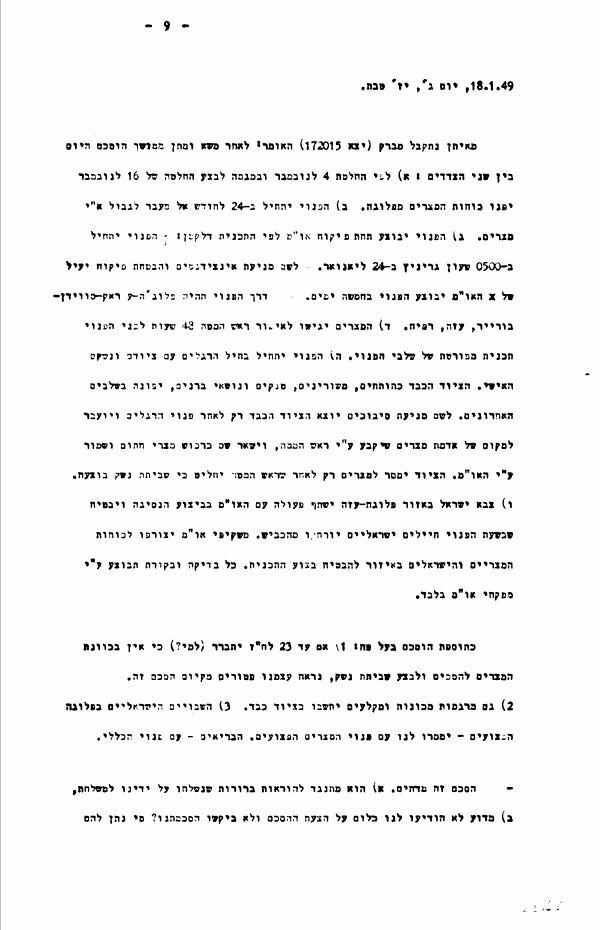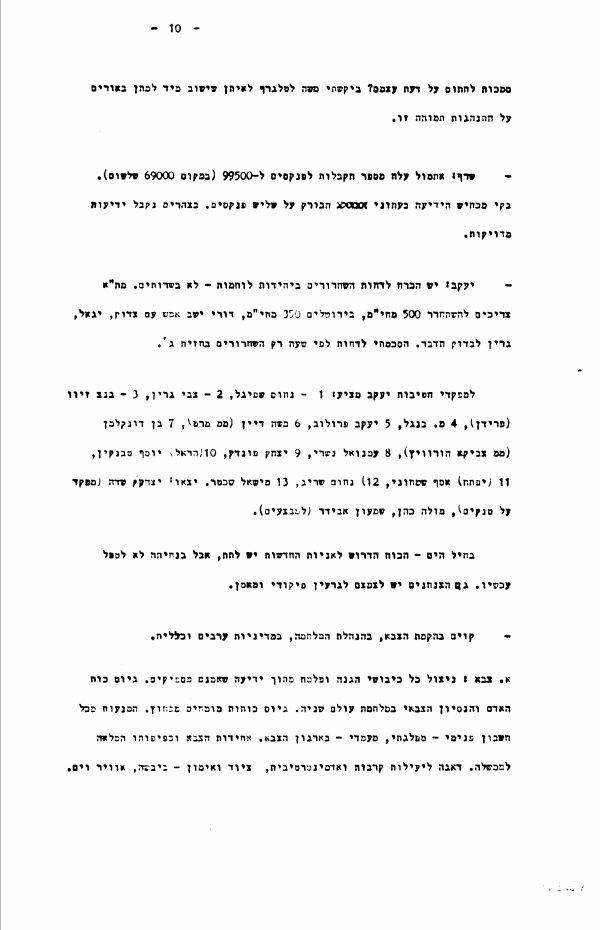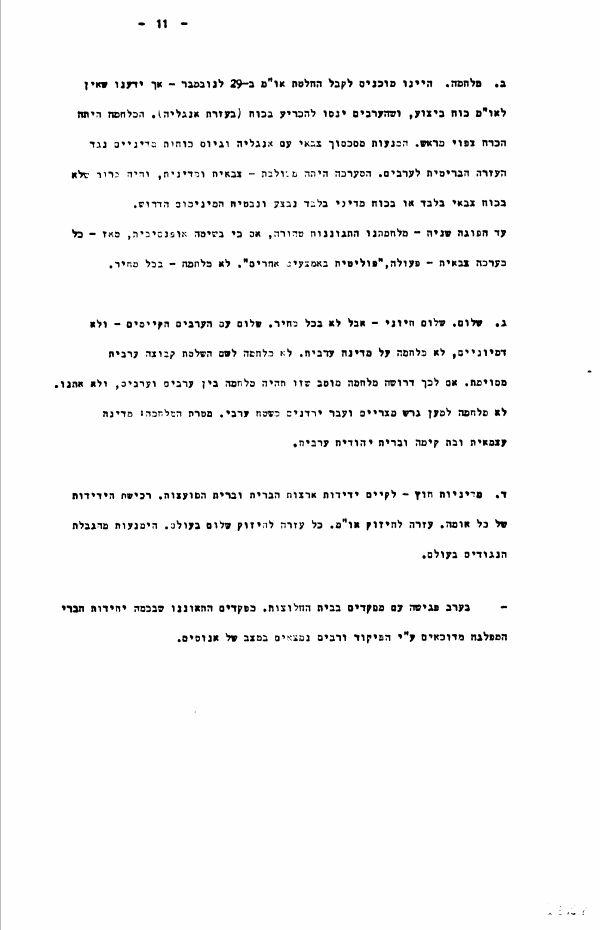Tuesday, January 18, 1949
A cable arrived from [Walter] Eytan (sent 172015 [from Rhodes]) stating: After lengthy negotiations, today it was agreed by the two sides that: A) Per the November 4 resolution and with a view to implementing the November 16 resolution, the Egyptian forces will be withdrawn from Faluja. B) The withdrawal will begin on the 24th of the month, to the other side of the Eretz-Israel - Egypt border. C) The withdrawal will be carried out under UN supervision according to the following plan: I. The withdrawal will begin at 0500 Greenwich time on January 24. II. To prevent incidents and ensure effective UN supervision, the withdrawal will be conducted over the course of five days. III. The route of withdrawal will be Faluja - Iraq-Suweidan - Burayr - Gaza - Rafiah. D) The Egyptians will submit a detailed plan on the stages of withdrawal for the approval of the [UN] chief of staff 48 hours before the withdrawal. E) The withdrawal will begin with infantry, including their equipment and personal weapons. The heavy equipment, such as cannons, armored vehicles, tanks, and Bren-carriers will only be removed in the final stages. To prevent complications, the heavy equipment will only be removed after the infantry has withdrawn, and will be transferred to a location on Egyptian land to be determined by the chief of staff, and will remain there as Egyptian property sealed and protected by the UN. The equipment will be handed over to Egypt only after the chief of staff has determined that the armistice has been implemented. F) The Israeli forces in the Faluja - Gaza area will cooperate with the UN in implementing the retreat and will ensure that during the withdrawal Israeli soldiers maintain a distance from the road. UN observers will accompany the Egyptian and Israeli forces in the area to ensure implementation of the plan. Every examination and inspection will be carried out solely by UN supervisors.
It was also agreed orally: 1) If by the 23rd of this month it becomes apparent (to whom?) that the Egyptians do not intend to agree to and implement an armistice, we will regard ourselves as released from this agreement. 2) Mortars, [heavy] machine [gun]s, and [light] machine guns will also be considered heavy equipment. 3) Israeli POWs in Faluja: those wounded will be turned over to us concurrent with the evacuation of the Egyptian wounded. The healthy ones - concurrent with the general withdrawal.
This agreement is astounding: A) It goes against the clear instructions that were sent by us to the delegation, B) Why didn't they tell us anything about the proposed agreement or seek our consent? Who gave them the authority to sign of their own accord? I asked Moshe [Sharett] to telegraph Eytan to return immediately to provide explanations for this astonishing conduct.
- Sherf: Yesterday the number of those receiving [ID] cards rose to 99,500 (in contrast to 69,000 two days ago). [Central Bureau of Statistics found, Prof. Roberto] Bachi [?] denies the reports in the morning newspapers regarding a third of the cards. In the afternoon we'll receive precise reports.
- Ya'akov: It's necessary to postpone the releases [from military service] in combat units - not in the services. In Tel Aviv 500 need to be released from garrison, in Jerusalem 350 from garrison; Dori sat down yesterday with Zadok, Yigael, Green to examine the matter. For now I agreed to postpone only the releases at Front C.
For brigade commanders Ya'akov proposes: 1 - Nahum Spiegel, 2 - Zvi Green, 3 - Bentz Ziv (Friedan) [sp.], 4 M. Ben-Gal, 5 Yaacov Prulov, 6 Moshe Dayan (alternate Mart [?]), 7 Ben Dunkelman (alternate Zvika Hurwitz), 8 Emanual Nishri, 9 Yitzhak Pundak, 10 (Harel) Yosef Tabenkin, 11 (Yiftah) Asaf Simhoni, 12 Nahum Sarig, 13 Mishal Schechter. Left: Yitzhak Sadeh (tank commander), Mulah Cohen, Shimon Avider (for Operations).
- In the Navy: The [man]power needed for the new ships - should be provided. But landing [forces] will not be addressed now. Paratroopers should also be reduced to a command and training core group.
[Topics for discussion with commanders:]
- Main points in forming the army, managing the war, Arab and general policy.
A. Army: Exploiting all the Haganah and Palmach conquests, keeping in mind that they are not enough. Conscription and the military experience from World War II. Enlisting expert forces from abroad. Avoiding any internal - political-party, class-based - calculations in organizing the army. The unity of the army and its complete subordination to the government. Ensuring combat effectiveness and administrative efficiency, equipment and training - on land, in the air, and at sea.
B. War. We were prepared to accept the UN resolution of November 29 - but we knew that the UN does not have the power to implement it, and that the Arabs would try to decide matters by force (with England's help). The war was a preordained necessity. Avoiding a military conflict with England and enlisting political forces against British assistance to the Arabs. The war was a combined effort - military and political - and it was clear that we would not be able to carry out and ensure the necessary minimum solely by military power or solely by political power. Until the second truce, our war was purely defensive, albeit by offensive methods. Since then, the entire military campaign entailed political action by other means. Not war - at any price.
C. Peace. Peace is essential - but not at any price. Peace with the existing - rather than fictitious - Arabs. Not a war over an Arab state. Not a war to instill the rule of a particular group. If this requires a war, it should be a war between Arabs, and not with us. Not a war in order to drive Egyptians and Transjordanians out of Arab territory. The aim of the war: an independent and sustainable state and a Jewish-Arab alliance.
D. Foreign policy - to maintain friendship with the United States and the Soviet Union. To secure friendship with every nation. To help strengthen the UN. To help strengthen world peace in every way. To refrain from aggravating the clashes in the world.
- In the evening a meeting with commanders at Beit HaHalutzot [the Women Pioneers' House]. Commanders complained that in some units party members are being browbeaten by the command and many are forced to act against their will.











